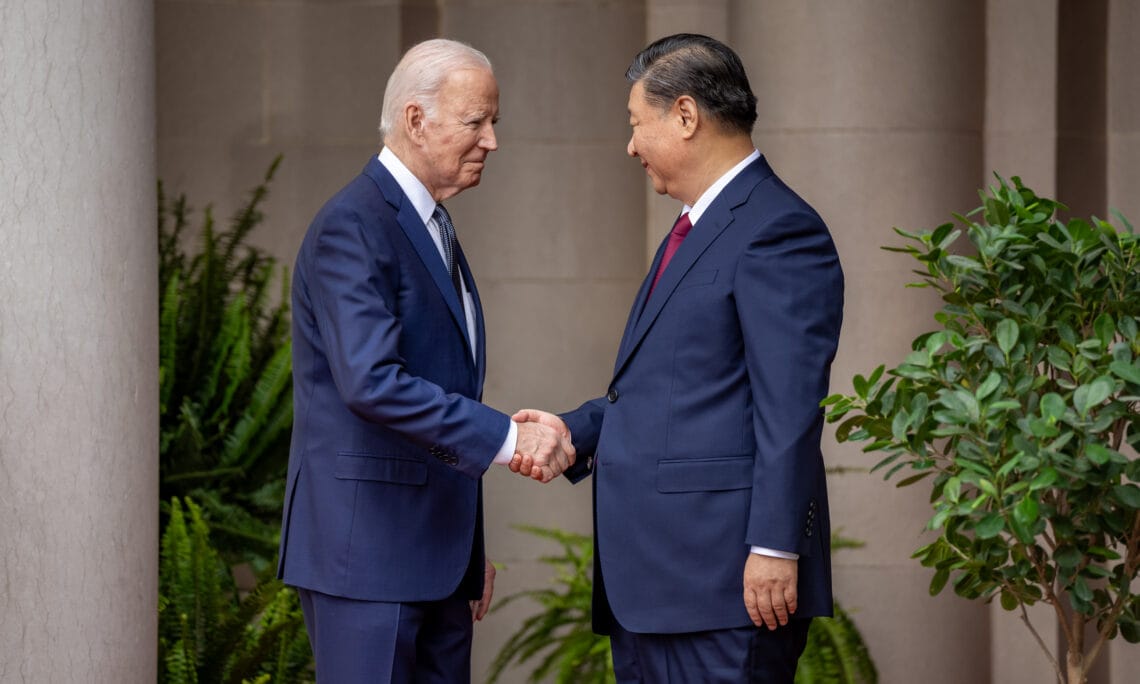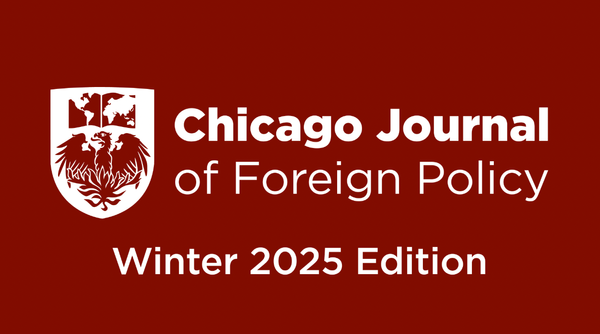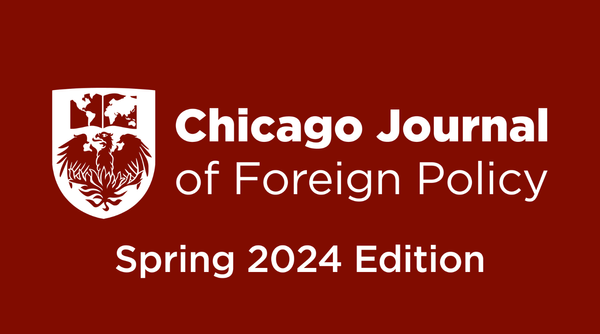Navigating the Dragon's Lair: Decoding Recent U.S. - China Tensions and Biden's Diplomatic Gambit with Xi Jinping

By Alejandra Sarmiento, University of Chicago
In the ever-shifting landscape of global geopolitics, the United States and China find themselves at the forefront of a complex and multifaceted relationship. Recent tensions between these two economic powerhouses have captured the world's attention, with implications reaching far beyond their respective borders. The dynamics of this relationship have been further spotlighted by the recent meeting between U.S. President Joe Biden and Chinese President Xi Jinping in San Francisco on November 15, 2023, an encounter that held the promise of easing current tensions but also raised questions about the future of Sino-American relations.
Overview of U.S.-China relations
The origins of the tensions between the U.S. and China can be traced to a myriad of issues, ranging from trade imbalances and technological competition to human rights concerns and territorial disputes. The trade war initiated by the Trump administration cast a shadow over economic ties, with tariffs and counter-tariffs affecting global markets. The technological rivalry between the U.S. and China has become a defining feature of their relationship. Issues related to 5G technology, artificial intelligence, and cybersecurity have created significant friction. Both countries have invested heavily in technological advancements, viewing them as crucial for economic competitiveness and national security. Biden's meeting with Xi provided an opportunity to address these concerns and explore potential areas for collaboration. Striking a balance between competition and cooperation in the technological realm is vital for preventing a new Cold War and ensuring that technological advancements benefit humanity as a whole.
The diplomatic spat over human rights issues in Xinjiang and Hong Kong added another layer of complexity, as the U.S. condemned China's alleged human rights abuses and imposed sanctions. The issue of counternarcotics and illegal drug production also arose; both leaders welcomed an approach to halt said production of trending dangerous substances such as fentanyl (1).
Human rights issues, particularly in Xinjiang and Hong Kong, have been a contentious point in U.S.-China relations. The Biden administration, building on the concerns raised by the Trump administration, has continued to emphasize human rights as a core component of its foreign policy. The meeting between Biden and Xi allowed for a candid exchange on these matters, with the U.S. expressing its concerns about alleged abuses in Xinjiang, while China defended its actions as internal affairs. Navigating human rights concerns while maintaining diplomatic engagement is a delicate balancing act for both countries.
U.S. and China’s economic interdependence acts as a double-edged sword. While their economies are deeply intertwined, trade tensions have been a consistent source of strain. The Trump-era trade war, marked by tit-for-tat tariffs disrupted global supply chains and sent shockwaves through financial markets. The Biden administration, while adopting a more strategic and multilateral approach, has not shied away from addressing economic concerns. The meeting between Biden and Xi allowed for discussions on trade imbalances, market access, and the protection of intellectual property rights. For both countries to foster stability in the global economy, they must find common ground in these economic matters.
The Biden Administration's Approach
Upon assuming office, President Joe Biden signaled a shift in U.S. foreign policy, adopting an approach to emphasize collaboration with allies to address shared concerns. Despite this change in tone, the Biden administration maintained a firm stance on certain issues, such as human rights, while seeking areas of cooperation on climate change and public health. The decision to engage with China was guided by a pragmatic understanding that the world's two largest economies must find a way to coexist and collaborate on global challenges.
The highly anticipated meeting between President Biden and President Xi Jinping took place against the backdrop of heightened tensions and a global audience eager for signs of a diplomatic breakthrough. One key aspect of the meeting was the recognition of the need for cooperation on global challenges. Climate change emerged as a focal point, with both leaders committing to enhanced collaboration to combat environmental degradation. The joint statement issued after the meeting emphasized a shared responsibility to address the climate crisis and underscored the significance of both countries working together to achieve tangible results.
Another significant topic of discussion was the ongoing COVID-19 pandemic. Both leaders acknowledged the importance of global vaccination efforts and committed to working together to ensure equitable access to vaccines worldwide. This collaborative approach signaled a departure from the vaccine diplomacy competition witnessed earlier in the pandemic, offering hope for enhanced international cooperation in addressing future health crises and an increased number of tourist influx to China considering the drastic decrease the nation has seen in American foreign visitors since the start of the pandemic, despite China opening its doors since March of 2023.
However, the meeting was not without its challenges. Both leaders addressed their respective concerns candidly, with Biden expressing worries about human rights issues in China and Xi asserting China's sovereignty over issues related to Taiwan and Hong Kong. The two leaders navigated these contentious topics with diplomatic finesse, recognizing the need for dialogue while acknowledging their differences.
Taiwan and Territorial Dispute
The status of Taiwan remains a sensitive and potentially volatile issue in U.S.-China relations. During the meeting, President Xi reiterated China's firm stance on issues related to Taiwan, asserting its sovereignty over the island. Navigating these territorial disputes requires careful diplomacy, as any misstep could escalate tensions in the region. The meeting highlighted the need for both countries to manage these disagreements while seeking common ground on broader regional stability.
Future Prospects
The Biden-Xi meeting marked a crucial step in resetting the tone of U.S.-China relations. The commitment to regular communication and engagement reflects an understanding that the two of the most influential countries must work together despite their differences. The emphasis on cooperation in areas of mutual interest, such as climate change and global health, provides a blueprint for constructive engagement.
Nevertheless, the road ahead remains challenging. The deep-rooted issues that fuel tensions between the U.S. and China cannot be resolved overnight. The delicate balancing act of addressing core concerns while seeking common ground requires sustained diplomatic efforts. As both countries navigate the complexities of their relationship, the role of regional actors and the international community will be crucial in fostering stability and promoting dialogue.
Conclusion
The recent tensions between the U.S. and China in addition to the subsequent meeting between President Biden and Xi Jinping are reflective of the complex nature of their relationship. While the leaders made strides in areas of cooperation, the underlying challenges persist. The dynamics between these two global powerhouses will continue to shape the course of international relations, with ramifications reaching far beyond their immediate interests. The path forward requires sustained diplomatic efforts, a commitment to finding common ground, and a recognition of the global implications of their interactions. As the world watches this geopolitical chess game unfold, careful navigation of the cross-currents that define this pivotal relationship is necessary for both parties.
Works Cited
1. The White House. “Readout of President Joe Biden’s Meeting with President Xi Jinping of the People’s Republic of China.” The White House, November 16, 2023. https://www.whitehouse.gov/briefing-room/statements-releases/2023/11/15/readout-of-president-joe-bidens-meeting-with-president-xi-jinping-of-the-peoples-republic-of-china-2/





